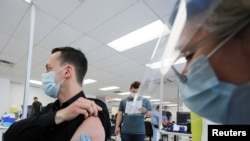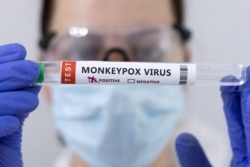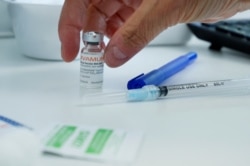On July 28, the U.S. Centers for Disease Control (CDC) data showed that the United States has 4,906 known cases of monkeypox – the most of any country so far.
Of the 21,148 global cases documented by the CDC as of that date, 20,804 of them were occurring in 71 countries that “have not historically reported monkeypox.”
The World Health Organization (WHO) recently declared the monkeypox outbreak a global health emergency.
While scientists work to get to the bottom of this surge in monkeypox cases, one prominent anti-vaccine group has decided to fuel speculation that the outbreak is unnatural.
The Children’s Health Defense, a top source of anti-vaccine disinformation, shared an excerpt from an interview with Dr. Meryl Nass on Twitter.
The interviewer asked Nass, a former a biological warfare epidemiologist, why there was “a big rush” to license the a monkeypox vaccine in 2019, “when there was no monkeypox outbreak.”
Nass conceded the vaccine was an older one developed by the Denmark-headquartered biotec company Bavarian Nordic, but still questioned why it only received Food and Drug Administration (FDA) approval in 2019.
“Did they know what was coming?” she asked, referring to the outbreak.
The host said “a lot of people would conclude” the government “knew monkeypox was coming,” and might reasonably question if the government had “spread it.”
Nass agreed. She said that “monkeypox has never spread like this before,” adding: “Is this a lab-engineered variant?”
The Children’s Health Defense tweeted:
“‘#Monkypox has never spread like this before’. – Dr. Meryl Nass, former biological warfare epidemiologist discussing the possibility of the virus being a bioweapon, especially since the vaccine was created prior to any major outbreaks.”
Here’s the problem: There is no evidence the current strain of monkeypox was lab-engineered. And speculation that the FDA's 2019 vaccine approval suggests that the government may have released monkeypox intentionally is a far stretch.
Monkeypox, endemic to West and Central Africa, was first discovered among monkeys at a Danish laboratory in 1958. Despite the name, the natural host of the disease is likely rodents and other small mammals.
Monkeypox is part of the same family of viruses as smallpox, and has similar expressions, including flu-like symptoms and lesions.
The last known natural case of smallpox, which was more contagious and deadly than monkeypox (killing millions annually), was documented in 1977. In 1980, the World Health Assembly declared that smallpox had been eradicated.
Smallpox does exist in laboratory research samples, and the United States Strategic National Stockpile has enough smallpox vaccine to inoculate every U.S. person.
There is nothing nefarious about the FDA approving the vaccine JYNNEOS (also known as Imvamune and Imvanex) in 2019.
“Monkeypox has been associated with sporadic outbreaks over the past decades,” Abby Capobianco, an FDA press officer, told Polygraph.info.
Due to their similarities, smallpox vaccines offer some protection against monkeypox.
As Smithsonian Magazine noted, “waning smallpox vaccine coverage” in Africa over the past three decades has coincided with “dozens of monkeypox outbreaks and an untold number of cases.”
For example, Nigeria experienced an outbreak in 2017, “almost 40 years after the country’s last reported case.”
In June 2003, dozens of confirmed cases of monkeypox erupted in six U.S. states. That outbreak was traced to the shipment of animals from Ghana to Texas.
Imported cases to the United States were also registered in 2021.
Fears of bioterrorism following the 9/11 terrorist attacks, and natural outbreaks, renewed concerns over naturally occurring viruses like smallpox.
That prompted the United States to ramp up investment in related medicines and vaccines. Still, it is a role of government to forecast and prepare for disaster. That preparation does not indicate a conspiracy.
The traditional smallpox vaccine can cause serious side effects. By contrast, JYNNEOS contains a weaker strain of the vaccinia virus, which is related to smallpox and monkey pox.
“JYNNEOS was developed as a safer alternative to the traditional smallpox vaccines for people with compromised immune system,” Thomas Duschek, a communications partner at Bavarian Nordic, told Polygraph.info.
“The [vaccine] development started in 2003, and since 2010 we have delivered the vaccine to the Strategic National Stockpile (most doses have expired since, but we are working to supply a freeze-dried version with improved shelf life).”
“Until 2019, it was never intended for monkeypox, but solely for smallpox. However, since historically smallpox vaccines have shown to protect also against monkeypox, the indication was expanded when FDA gave their approval,” he said.
Although JYNNEOS got FDA approval in 2019 as a vaccine against both smallpox and monkeypox, Europe had approved it as a vaccine against smallpox in 2013.
The latest outbreak has been different than previous ones.
A leading adviser to the World Health Organization said it seems to have been “caused by sexual activity at two recent raves in Europe,” the Associated Press reported.
Gay and bisexual men have been disproportionately affected. Scientists are still trying to determine if the disease spreads via sex or simply close physical contact.
As noted by WHO chief Tedros Adhanom Ghebreyesus: “Although I am declaring a public health emergency of international concern, for the moment this is an outbreak that is concentrated among men who have sex with men, especially those with multiple sexual partners. That means that this is an outbreak that can be stopped with the right strategies in the right groups.”
Previously, animal-to-human contact was much more commonly linked the virus’s spread.
Leading health experts have taken note.
“We get concerned when we see a virus doing things that we don’t normally see it doing,” Anne Rimoin, an epidemiologist at the University of California, Los Angeles, told Science Magazine.
Still, that is not evidence the virus is non-natural in origin.
Science Magazine reports that researchers have begun the laborious task of genetic sequencing to determine how the virus has spread and what mutations make it more transmissible.
Geneticist Fatima Tokhmafshan told the BBC this type of sequencing helps scientists identify viral origins like “scanning a barcode on a parcel.”
“The first full genome, posted on 19 May by a Portuguese team … showed that the strain most closely resembles viruses carried by travelers from Nigeria to Singapore, Israel, and the United Kingdom in 2018 and 2019. Sequences posted by the CDC and scientists in Belgium and Germany support that conclusion,” Science Magazine reported.
Available genetic sequences trace the current monkeypox strain back to West Africa. “That tells us this is not something manufactured,” Tokhmafshan told the BBC.
Citing the Institute for Strategic Dialogue, the BBC noted that a number of “cut-and-paste” COVID-19 conspiracy theories are being revived with monkeypox.
Meantime, Johns Hopkins Medicine notes that monkeypox transmission “requires close personal contact.”
As such, a pandemic similar to COVID-19 “is not expected.”







